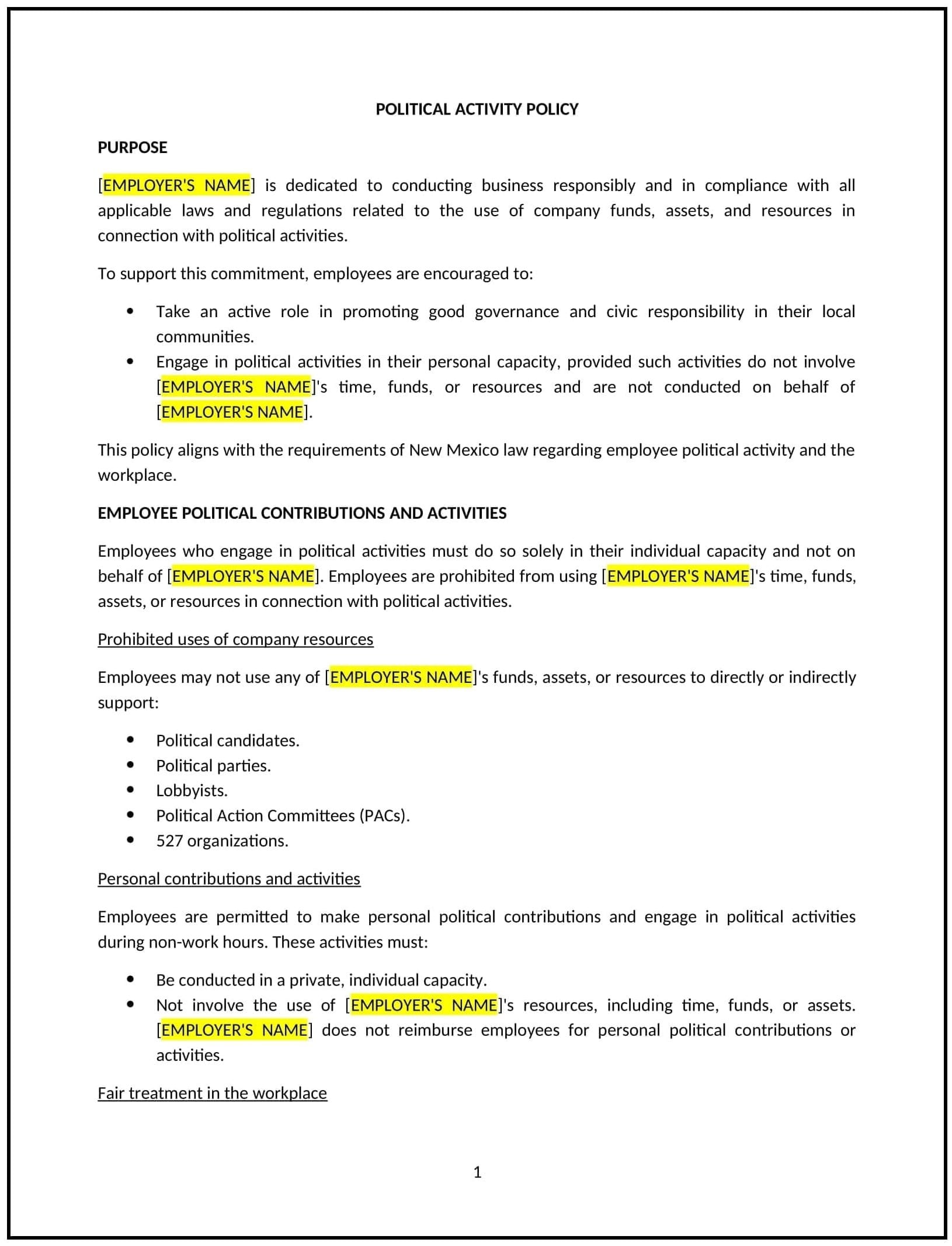Political activity policy (New Mexico): Free template
Got contracts to review? While you're here for policies, let Cobrief make contract review effortless—start your free review now.

Customize this template for free
Political activity policy (New Mexico)
This political activity policy is designed to help New Mexico businesses address employee involvement in political activities while maintaining a clear distinction between personal and professional interests. The policy outlines the company’s stance on employee political activities, including campaigning, lobbying, and other political involvements, both during and outside of work hours. The goal is to protect the business from potential conflicts of interest, ensure that employee political activities do not interfere with business operations, and respect employees’ rights to participate in political processes.
By adopting this policy, New Mexico businesses can create a respectful and productive work environment, balancing the protection of company interests with the recognition of employees' rights to engage in political activities.
How to use this political activity policy (New Mexico)
- Define political activities: Clearly outline what constitutes political activity, including voting, participating in political campaigns, contributing to political organizations, and engaging in lobbying efforts.
- Establish guidelines for political involvement: Specify the circumstances under which employees may engage in political activities, both inside and outside of work. Ensure that these activities do not interfere with job performance or create conflicts of interest.
- Set boundaries on the use of company resources: Specify that employees should not use company time, facilities, equipment, or funds for political purposes unless explicitly authorized. This includes using company email, office supplies, or social media accounts for political activities.
- Clarify company position on political contributions: Explain the company’s stance on political donations, both from the business and individual employees, and provide guidance on when employees can make personal political donations.
- Reflect New Mexico-specific considerations: Address any state-specific laws or regulations, including restrictions on political contributions or activities, and ensure the policy aligns with local political landscapes in New Mexico.
Benefits of using this political activity policy (New Mexico)
Implementing this policy provides New Mexico businesses with several advantages:
- Prevents conflicts of interest: The policy helps prevent potential conflicts of interest between employees’ political activities and the business’s interests, ensuring that employees’ personal political views do not interfere with their work duties.
- Protects company resources: By clarifying that company resources cannot be used for political purposes, businesses safeguard their reputation and ensure that resources are allocated appropriately.
- Promotes a respectful work environment: By setting clear boundaries, businesses help create a workplace where employees can freely express their political beliefs without creating tension or division within the team.
- Supports employee rights: The policy respects employees’ rights to engage in political activities while maintaining transparency and fairness in how these activities are managed.
- Enhances business reputation: A clear, well-communicated policy on political activity demonstrates that the company values a professional environment while respecting the individual freedoms of its employees.
Tips for using this political activity policy (New Mexico)
- Communicate the policy clearly: Ensure that all employees understand the policy and know what is expected of them regarding political activities. Include the policy in the employee handbook and discuss it during orientation or team meetings.
- Monitor adherence to the policy: Regularly review employee involvement in political activities and ensure that it is in line with the company’s guidelines. Address any issues or conflicts that may arise promptly and respectfully.
- Be consistent and fair: Apply the policy consistently across all employees, ensuring that no one is unfairly targeted for their political beliefs while maintaining professional conduct.
- Review the policy regularly: The political activity policy should be reviewed at least annually to ensure it remains relevant to current political climates, legal changes, and the evolving needs of the business.
- Maintain flexibility: While the company should maintain guidelines for political activities, there should be room for discussion and flexibility in addressing situations that may arise unexpectedly, ensuring the business remains adaptable.